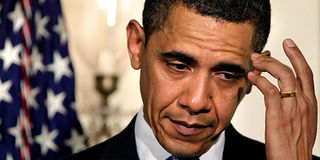Breaking News: At least 10 feared to have drowned in Makueni river
US might cut Sh65b health aid to Kenya

Photo/FILE
Funding for this year is now in doubt following a deficit-cutting deal struck by President Obama and the Congress last month.
American lawmakers might block Sh195 billion ($2.1 billion) three-year aid package to fight Aids and malaria in Kenya budgeted for by President Barack Obama’s government.
The US Congress has demanded cuts in foreign aid to address domestic shortfalls and the health aid package, under which Kenya’s health sector was to be supported with Sh65 billion a year for three years, could be one of the casualties.
Kenya is among eight developing countries participating in the six-year $93 billion (Sh8.6 trillion) Global Health Initiative (GHI) programme that seeks to improve access to, and improve the quality of, medical services.
The programme focuses on malaria, tuberculosis, Aids, maternal health, child mortality, nutrition and strengthening of health systems and is run by USAID, America’s agency for international development.
The project was intended to build on former US President George Bush’s malaria and HIV programmes that have been credited with providing anti-retroviral medicines and bed nets to thousands of Kenyans.
Duplication of roles
Initiated in 2009, it was meant to put all American-funded health programmes in the country under one stream to eliminate duplication of roles and improve efficiency.
It was also expected to respond to criticism that American projects in the country provided for little government involvement. But the takeoff has been slow.
For example, it was only in March this year that the US embassy in Nairobi managed to launch the Kenya Strategic Plan 2011-2014 to guide use of the kitty.
The initiative received $576 million (Sh54 billion) in 2009 and $600 million (Sh56 billion) in 2010.
Funding for this year is now in doubt following a deficit-cutting deal struck by President Obama and the Congress last month. (READ: Parties strike deal to raise US debt limit)
The alarm was first raised by about 100 American international development agencies in a petition to Congress warning that the cuts would hurt American interests in Africa.
“It is important that US efforts to defend our national security be augmented by health and development policies and programmes that prevent inequity and unrest,” says the petition signed on August 25th.
In sentiments shared by the American Chamber of Commerce, Dr Christopher J. Elias, president of PATH, an international development organisation with several projects in Kenya, said the move could hurt American exports to developing countries.
Fiscally imprudent
“Choosing to cut investment now to countries that have the potential to become America’s next big trading partner is not only myopic, but fiscally imprudent,” he says.
Deep cuts in foreign aid could also affect the deployment of thousands of Americans who work in these programmes.
In Kenya, most US funds for development are channelled through USAID, the Centres for Disease Control and Prevention, the Department of Defence and the Peace Corps. According to the American embassy in Nairobi, there are about 15,000 registered US citizens in Kenya.
On Sunday, however, President Obama expressed optimism in a message to mark the tenth anniversary of the 9/11 terrorist attack in New York. (IN PICTURES: Remembering 9/11)
“Around the world, we will continue the hard work of pursuing peace, promoting the development that lifts people from poverty, and advancing the food security, health and good governance that unleashes the potential of citizens and societies,” he said.
On Wednesday, Reuters news agency warned President Obama’s policy of focusing on development rather than aggression faces tough times ahead.
“President Barack Obama’s pledge to boost America’s global standing by ramping up US diplomacy and development aid faces death by a thousand cuts as lawmakers prepare to carve huge chunks out of US overseas spending to address budget shortfalls,” said the report.
The cuts will also affect the global fight against hunger which was banking on American generosity.
“The Kenya GHI strategy will move us toward sustaining a health system that ensures we have an independent, healthy, and thriving future for our citizens,” said Dr SK Sharif, the director of Public Health and Sanitation, recently.




